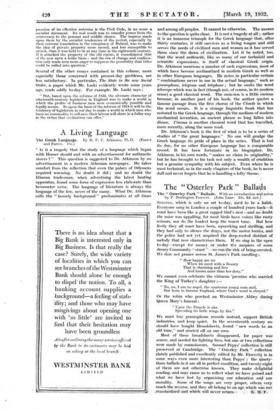A Living Language
" Is it a tragedy that the study of a language which began with Homer should end with an advertisement for anthracite stoves ? " This question is suggested to Dr. Atkinson by an advertisement in a modern Athenian newspaper. He takes comfort from the reflection that even the palace of Odysseus required warming. No doubt it did ; and no doubt the Ithacan tradesman, when advertising the latest heating apparatus, found some form of expression less elaborate than hexameter verse. The language of literature is always the language of the few, never of the many. What Dr. Atkinson calls the " homely background " predominates at all times and among all peoples. It cannot be otherwise. The answer to'the question is quite clear. It is not a tragedy at all ; rather it is an immense triumph for the Greek language' thirt, after thirty centuries, it still survives as a living tongue and still serves the needs of civilized men and women as it has'verved them since the dawn of civilization. Let it be noted, too, that the word anthracite, like so many of our technietd and scientific expressions, is itself of classical Greek origin. Dr. Atkinson mentions a number of such expressions, most of which have become acclimatized in modern Greek as well as in other European languages. He notes in-particular Certain " combinations never in use in the actual language," such as gramophone, telegram and telephone ; but he omits the word telescope which was in fact (though not, of course, in its modern sense) a good classical word. The omission is a little curious because, in another part of his book, the author quotes a famous passage from the first chorus of the Clouds in which the word occurs. It is a strange linguistic freak that has restored to the Greek language, through the medium of modern mechanical invention, an ancient phrase Co long fallen into disuse. Cinema is another classical word that has travelled, more recently, along the same road.
Dr. Atkinson's book is the first of what is to be a series of studies of " the great languages." No one will grudge the Greek language its pride of place in the series. That is but its due, for no other European language has a comparable record. It has been fortunate in its biographer. Dr. Atkinson, in his own words, " makes no claim to originality," but he has brought to his task not only a wealth of erudition but a genuine sympathy with his subject. Even where he is most technical, as in the early chapters of the book, he is never dull and never forgets that he is handling a lofty theme.






































 Previous page
Previous page